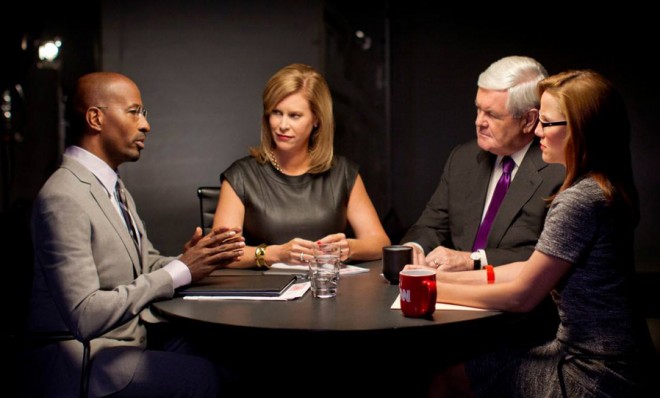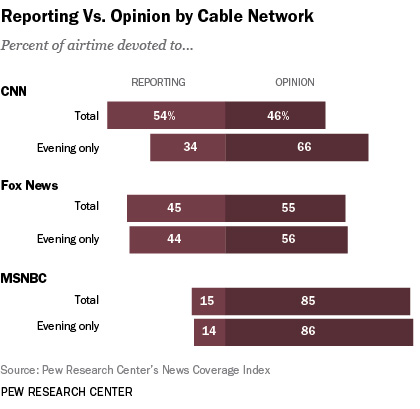5 signs that CNN's Crossfire is doomed
The televised partisan catfight is back. And critics dislike it now more than ever.

A free daily email with the biggest news stories of the day – and the best features from TheWeek.com
You are now subscribed
Your newsletter sign-up was successful
The cacophonous pundit showdown that Daily Show host Jon Stewart once decried as "hurting America" is back after an eight-year hiatus. Yes, last night Crossfire officially re-launched on CNN. Critics were not kind.
The hosts for the premiere: Former House Speaker Newt Gingrich on the right and Stephanie Cutter, deputy manager of President Obama's re-election campaign, on the left. (They will alternate nights with conservative columnist S.E. Cupp and former Obama adviser Van Jones).
Here are a few of the highlights from critics' initial reviews suggesting that the new Crossfire might not be long for this world.
The Week
Escape your echo chamber. Get the facts behind the news, plus analysis from multiple perspectives.

Sign up for The Week's Free Newsletters
From our morning news briefing to a weekly Good News Newsletter, get the best of The Week delivered directly to your inbox.
From our morning news briefing to a weekly Good News Newsletter, get the best of The Week delivered directly to your inbox.
1. It's like ESPN, only way less fun
The dramatic graphics and sound effects create the feeling that CNN is "aping the format of ESPN's round-table-type afternoon discussion shows," writes Bryan Lowry of Variety. Instead of pop-culture catchphrases and a screaming Stephen A. Smith, however, the show featured Sens. Rand Paul (R-Ky.) and Robert Menendez (D-N.J.) talking about the situation in Syria.
2. The hosts aren't nearly mean enough to each other
Gingrich "seemed a bit like a sedated bear," writes the New Republic's Laura Bennett. TIME's James Poniewozik likens the experience to "watching a catfight between stuffed cats," calling the dialogue "uncomfortably stilted."
A free daily email with the biggest news stories of the day – and the best features from TheWeek.com
"If you're going to have on-air sniping as news entertainment," Poniewozik writes, "it should at least be genuine and from the gut."
Yes, Crossfire was criticized in 2005 for its theatrical bickering, but if people wanted to watch calm, reasonable political discourse, they would just tune into Charlie Rose.
"They just to need to start acting less like the debate's moderators and more like its partisan participants," writes Politico's Dylan Byers. "We're here to see them fight, not to see them get along."
3. Cable news is full of argumentative shows
When Crossfire debuted in 1982, the idea of talking heads squabbling over politics was slightly more novel. Now, as the Pew Research Center has found, commentary actually takes up more airtime on cable news networks than reporting.

CNN was the exception, barely, with only 46 percent of its programming committed to commentary. That number will likely go up — although its hard to predict whether Crossfire's ratings will go up with it.
4. There was a distinct lack of hot-button issues
Letting pundits battle it out like gladiators in the Coliseum make sense when the topic is abortion or gay marriage. That doesn't hold for Syria, writes Poniewozik, claiming it's "exactly the kind of issue that flummoxes Crossfire's partisan assumptions." He adds:
There's not really a "from the left, from the right" on it; guest Rand Paul's opposition to the attack could have been delivered by a leftist guest as well. Meanwhile, opposing him was Sen. Robert Menendez, making a qualified endorsement of a "limited strike." Contain your qualified, limited excitement! [TIME]
5. Newt Gingrich couldn't remember the name of the show
At one point, Gingrich, 70, welcomed his guests to "Ceasefire," which was the name of an upcoming segment. Not exactly a great sign.
Keith Wagstaff is a staff writer at TheWeek.com covering politics and current events. He has previously written for such publications as TIME, Details, VICE, and the Village Voice.
-
 Political cartoons for February 16
Political cartoons for February 16Cartoons Monday’s political cartoons include President's Day, a valentine from the Epstein files, and more
-
 Regent Hong Kong: a tranquil haven with a prime waterfront spot
Regent Hong Kong: a tranquil haven with a prime waterfront spotThe Week Recommends The trendy hotel recently underwent an extensive two-year revamp
-
 The problem with diagnosing profound autism
The problem with diagnosing profound autismThe Explainer Experts are reconsidering the idea of autism as a spectrum, which could impact diagnoses and policy making for the condition
-
 The billionaires’ wealth tax: a catastrophe for California?
The billionaires’ wealth tax: a catastrophe for California?Talking Point Peter Thiel and Larry Page preparing to change state residency
-
 Bari Weiss’ ‘60 Minutes’ scandal is about more than one report
Bari Weiss’ ‘60 Minutes’ scandal is about more than one reportIN THE SPOTLIGHT By blocking an approved segment on a controversial prison holding US deportees in El Salvador, the editor-in-chief of CBS News has become the main story
-
 Has Zohran Mamdani shown the Democrats how to win again?
Has Zohran Mamdani shown the Democrats how to win again?Today’s Big Question New York City mayoral election touted as victory for left-wing populists but moderate centrist wins elsewhere present more complex path for Democratic Party
-
 Millions turn out for anti-Trump ‘No Kings’ rallies
Millions turn out for anti-Trump ‘No Kings’ ralliesSpeed Read An estimated 7 million people participated, 2 million more than at the first ‘No Kings’ protest in June
-
 Ghislaine Maxwell: angling for a Trump pardon
Ghislaine Maxwell: angling for a Trump pardonTalking Point Convicted sex trafficker's testimony could shed new light on president's links to Jeffrey Epstein
-
 The last words and final moments of 40 presidents
The last words and final moments of 40 presidentsThe Explainer Some are eloquent quotes worthy of the holders of the highest office in the nation, and others... aren't
-
 The JFK files: the truth at last?
The JFK files: the truth at last?In The Spotlight More than 64,000 previously classified documents relating the 1963 assassination of John F. Kennedy have been released by the Trump administration
-
 'Seriously, not literally': how should the world take Donald Trump?
'Seriously, not literally': how should the world take Donald Trump?Today's big question White House rhetoric and reality look likely to become increasingly blurred